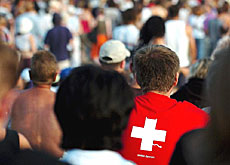Study calls for action over youth violence

Violence among young foreigners is not an ethnic but a social problem according to a study carried out for the Federal Foreigners Commission.
A solution to youth violence is more likely to be found in wide-ranging prevention measures that start at a young age, say the report’s authors.
The Foreigners Commission’s president, Francis Matthey, said in Bern on Tuesday that violent young foreigners were overrepresented in the crime statistics.
However, he said that the commission believed that the roots of the problem were more likely to be found in a young person’s social environment.
“The Foreigners Commission believes you shouldn’t label an issue a foreigners’ problem when it is actually a social one,” added Matthey.
“We have to reduce the risk factors and increase the protection factors.”
This would require global action rather than a specific programme for young foreigners, which the commission feels would send out the wrong signals.
Matthey added that the aim of a foreigners’ policy should be to provide a climate in which young people felt they had perspectives for the future.
What is especially important is a “welcoming culture” where young people of foreign origin felt they had a chance in society, he added.
Targeting youngsters
The study, prepared by criminologist Manuel Eisner, looked at worldwide examples to see what sort of projects were best at helping prevent violence among young people.
Eisner concluded that prevention measures should begin very early, as violent youngsters often showed signs of aggression when very young children.
This could take the form of projects targeting mothers with babies and continue through kindergarten and primary school. This would be aimed mostly at people living in difficult social situations.
Support could also be given to low-income parents and mentoring schemes could also help steer young people away from violence, said Eisner.
These proposals would entail specialised training being given to those working in education, health and social work.
The study was carried out as part of the Foreigners Commission’s integration programme.
It follows a report released earlier this month by the Federal Migration Office that concluded that the integration of young foreigners could be helped through school and that access to the job market was key to integration.
swissinfo with agencies
There are 1.5 million foreigners living in Switzerland, just over one fifth of the total population.
Just over two thirds have permanent resident status.
In 2005, just under 40,000 foreigners became Swiss, the largest group of new citizens coming from Serbia-Montenegro.
The Swiss government considers better integration of foreign residents one of its most important challenges.
Integration is understood as a mutual process.
This process requires both the foreign nationals’ readiness to be integrated and openness on the part of the Swiss population.
It aims to offer equal opportunity regarding access to social and economic resources.
Federal law sets the government’s financial contribution towards the promotion of integration.
For 2004-2007 period, SFr14 million per year has been earmarked by the federal authorities.

In compliance with the JTI standards
More: SWI swissinfo.ch certified by the Journalism Trust Initiative



You can find an overview of ongoing debates with our journalists here. Please join us!
If you want to start a conversation about a topic raised in this article or want to report factual errors, email us at english@swissinfo.ch.